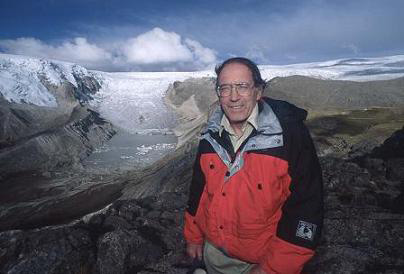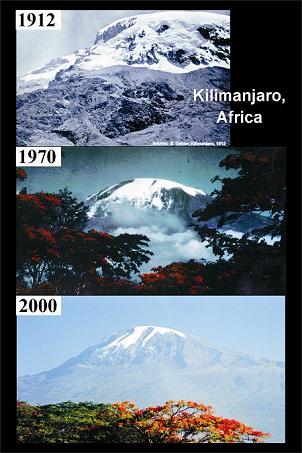 The Ninth Annual Henry W. Kendall Memorial Lecture
The Ninth Annual Henry W. Kendall Memorial Lecture
 Professor Lonnie Thompson is a renown geologist and authority on ice-cores. He is Distinguished University Professor in the Department of Geological Sciences at The Ohio State University School of Earth Sciences, and Senior Research Scientist at the OSU Byrd Polar Research Center.
Professor Lonnie Thompson is a renown geologist and authority on ice-cores. He is Distinguished University Professor in the Department of Geological Sciences at The Ohio State University School of Earth Sciences, and Senior Research Scientist at the OSU Byrd Polar Research Center.
His research has propelled the field of ice core paleoclimatology out of the Polar Regions to the highest tropical and subtropical ice fields. He and the OSU team have developed light-weight solar-powered drilling equipment for acquisition of histories from ice fields in the tropical South American Andes, the Himalayas, and on Kilimanjaro. These paleoclimate histories have advanced our understanding of the coupled nature of the Earth's climate system. Special emphasis has been placed on the El Niño and monsoon systems that dominate the climate of the tropical Pacific and affect global-scale oceanic and atmospheric circulation patterns. His observations of glacier retreat over the last three decades confirm that glaciers around the world are melting and provide clear evidence that the warming of the last 50 years is now outside the range of climate variability for several millennia, if not longer.
Among Prof. Thompson's many honors, he is a recipient of The Tyler Prize—the World Prize for Environmental Achievement (2005), and the U.S. National Medal of Science (2007); he was also named a 2008 Hero of the Environment by Time Magazine.
To learn more about Prof. Thompson, see for example:
- Ice Man: Lonnie Thompson - Science, 298 (Oct 18, 2002)
- Profile of Lonnie G. Thompson - Proceedings of the U.S. National Academy of Sciences, 103 (Aug 1, 2006)

The Henry W. Kendall Memorial Lecture Series honors the memory of Professor Henry W. Kendall (1926-1999) who was the J.A. Stratton professor of physics at MIT. Professor Kendall received the Nobel Prize in 1990 for research that provided the first experimental evidence for quarks. He had a deep commitment to understanding and finding solutions to the multiple environmental problems facing the world today and in the future. The permanently endowed Kendall Lecture allows MIT faculty and students to be introduced to forefront areas in global change science by leading researchers.
A founding member of the Union of Concerned Scientists in 1969, he served as its chair for 25 years. Prof. Kendall was deeply involved with arms control and nuclear power safety issues. He played a leading role in organizing scientific community statements on global problems, including the World Scientists' Warning to Humanity in 1992 and the Call for Action at the Kyoto Climate Summit in 1997. His publications included, "Energy Strategies: Toward a Solar Future" (1980), "Beyond the Freeze" (1982), "Fallacy of Star Ways" (1985), and "Crisis Stability and Nuclear War" (1988). He received the Bertram Russell Society award in 1992, the Environmental Leadership award from Tufts University's Lincol Filene Center in 1991, the Ettore Majorana-Erice Science for Peace prize in 1994, the Award for Leadership in Environmental Stewardship from the Johns Hopkins Center for a Livable Future in 1997 and the Nicholson Medal for Humanitarian Services from the American Physical Society in 1998.
Several previous Kendall Memorial Lecture presentations are available on
MIT World.
- The Kendall Memorial Lecture is presented by the Department of Earth, Atmospheric and Planetary Sciences, the Department of Civil and Environmental Engineering, and the Center for Global Change Science at the Massachusetts Institute of Technology.
Image credits – Thompson (top): L. Thompson/Byrd Polar Research Center/OSU; Thompson (on home page image): Thomas Nash (from Iceman article in Science); Mt. Kilimanjaro (bottom): L. Thompson/Byrd Polar Research Center/OSU.
